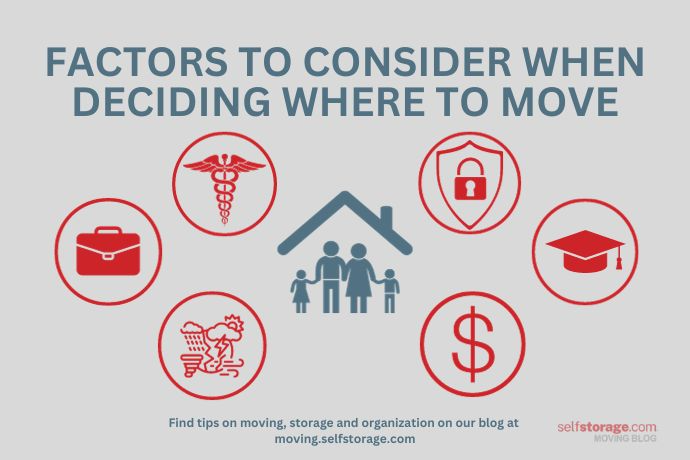Moving into a new apartment or home is both exciting and intimidating, especially if it’s your first time. Whether you’re just moving a couple of miles to a new neighborhood or you’re packing up and moving across the country, you’ll be out of your depth or fall for moving scams if you don’t do some research beforehand.
Take time to look into housing, economic, social, and quality of life factors in neighborhoods you might want to make your new home will help you make the right decision when the time comes. In this article, we’ll go over each of those factors and explore ways to be sure you’re satisfied in whatever neighborhood you choose to move to.
What should I consider when looking at housing options?
You can’t move to a new place if you don’t have somewhere to live, so your priority when planning a move should be identifying what options there are for housing. To start, figure out what meets your needs and fits your budget–if you’re living on your own or your family is relatively small, an apartment or condo may be what you’re looking for; if you have a large family or need extra space to grow, townhouses or standalone houses could be perfect.
Once you have some options in play, make a trip to the neighborhood or city you’re considering to tour some living spaces before you make a decision. You’ll be able to get a sense for the space in person that you can’t get from a distance, and you’ll also be able to explore and decide whether the area is right for you. If you need to find a place to live or plan on moving somewhere sight unseen, you may have to take a few extra steps to protect yourself.
If you’re working with a real estate agent, you can ask them for some information about the neighborhood, but you’ll want to strike out on your own to paint a more complete picture of it. U.S. News & World Report offers the following tips to gather information about a neighborhood before you move there:
- Visit at different times of day. Neighborhoods will likely feel different on the weekend than they do on weekdays, and daytime and nighttime visits will tell you quite a bit about how it feels to live there. For example, is there heavy car traffic on weekdays? Do residents seem like they feel safe walking or bicycling after dark?
- Talk with residents. The best way to get a feel for what it’s like to live somewhere is to ask someone who already does. Residents don’t have an incentive to tell you anything but the truth, so ask them what they like and dislike about the area.
- Consider how close entertainment options are. If you’re moving to a city, it’s worth checking to see if you can walk to local shopping, food, and nightlife areas, and deciding whether it’s worth depending on your car if they’re not walkable.
- Examine online resources. There are plenty of websites and services that can help paint a complete picture of your potential new neighborhood and answer questions you may have that can’t be answered by visiting in person. Here are a few to consider:
How should I calculate the cost of living in a new neighborhood?
The base cost of renting or buying a new living space is far from the only thing you’ll need to consider when getting ready for a move. Aside from regular bills like utilities and Internet, it’s important to budget for things like gasoline and groceries to get an accurate picture of how much you’ll pay per month living in a new neighborhood. Here are a few questions to ask yourself while planning out that potential budget.
- Do I plan on buying or renting a home? Buying will cost more up front, but if it’s in your budget, you may be able to save long-term by owning a home rather than renting one. Consider monthly payments for each option and compare them with your budget.
- How does the weather and climate vary between seasons? Extremely hot and humid summers and extremely cold winters may raise your energy costs if your HVAC system winds up working harder to account for extremes.
- How much is local sales and income tax? Taxes will factor into your cost of living on both a monthly and yearly basis. If you’re moving to one of the eight U.S. states that don’t charge income tax (Alaska, Florida, Nevada, New Hampshire, South Dakota, Tennessee, Texas, or Wyoming) you’ll want to factor that in as well, as they’ll potentially save you money to spend in other areas.
- How much will commuting cost? Check local gas price ranges and work out how much you’ll pay in gas per commute.
- How affordable are childcare options? If you have children who need to be taken care of while you’re at work, research local daycare and babysitting options to factor into your budget.
- How much will groceries cost? Food prices vary from area to area, so be sure to research them before making a decision on where to move.
Line up these potential costs with the budget you’re working with to see if you can comfortably afford moving to this new area. CNN Money has a cost-of-living calculator that can be a helpful tool in assessing your overall financial portrait before you move.
What should I consider when looking at the local economy in a new neighborhood?
Different towns, cities, and neighborhoods have different economic statuses, and a strong economy will lead to a higher quality of life in the long run. When researching new areas you might want to move to, examine the area’s economy and work out whether its economic growth and job opportunities will meet your needs. You’ll also want to look at the unemployment rate in your area and local economic policies to get a sense of how your potential new home will affect your quality of life over time.
How should I assess job opportunities in a new area?
While many jobs and careers are handled remotely, local job and career opportunities can play an important role in your decision to move somewhere. Look into the job market in your fields of expertise and see how many opportunities are available in your industry–moving somewhere you won’t be able to succeed in your career will massively impact your finances and well-being.
Having a backup plan in case your current or promised job doesn’t work out in your favor will also help you when researching the job market in a new city. Will you have opportunities to fall back on? Will you need to change jobs if your current job is local only? It’s nearly impossible to do too much planning when making as big a decision as this.
According to Indeed, you should consider the following factors when deciding whether to move for a job:
- Career growth
- Personal satisfaction
- Opportunity for advancement/promotion
- Location value
- Salary and benefits
- Cost of moving
- Effect on your relationships
- Whether the company might offer other options besides relocating
What should I consider when looking at local culture and social aspects?
Take some time to think about and research whether the local culture around the neighborhoods you’re considering is in line with what you value and enjoy doing. For example, if you prefer outdoor activities to nightlife, you might not want to move to a busy city center where nightlife is the focus.
As a general rule, smaller towns are often more laid-back and feature more outdoor activities and parks, while larger cities have more indoor activities and cater to a faster-paced lifestyle. Ask yourself the following questions to identify whether the neighborhood you’re looking at is right for you:
- How do I like to spend my leisure time?
- Do I prefer nature hikes and parks, or do I prefer restaurants, shopping, and nightlife?
- How do I plan to meet new people if my friends and family won’t be nearby?
- How easy does it appear to make new friends in this area?
You’ll want to research local community events, recreation opportunities, and social gatherings to determine the “vibe” of the area you’re examining. Making an in-person visit will also allow you to see if your potential new home fits your social and lifestyle needs.
A quick tip: research whether your college or university has a strong alumni presence in your new area–these groups can help you meet people with common backgrounds and go to events with potential new friends.
What should I consider when examining the quality of life in a new neighborhood?
Housing, economy, and local culture all factor into quality of life in a neighborhood, but there are plenty more factors to consider when evaluating how well you’ll be living after you move. Here are a few miscellaneous things to examine while you’re visiting and doing research to ensure your new home is right for you.
Neighborhood safety and security
Your bodily safety and the safety of your valuable belongings can vary wildly between neighborhoods. Before you move, research crime rates, police presence, and how safe residents tend to feel while at home. Check in with local neighborhood watch programs to see what measures are in place to protect residents, and ask potential neighbors while visiting the area if there are any crime concerns to watch out for.
Healthcare options
Retirees, people who have chronic health conditions, and families with young children should all keep an eye on what healthcare facilities are available in a new neighborhood, but even a healthy young adult should pay attention to what hospitals and doctors are near a potential new home. The size of the city or town may greatly affect the availability and quality of healthcare services and facilities, hospitals, clinics, and medical professionals in the vicinity.
Children, people with long-term conditions, and the elderly will benefit from being close to a reputable clinic or hospital in case of an emergency. The U.S. Department of Health and Human Services recommends taking the following steps to choose the best hospital for you and your family’s needs:
- Learn about the care you need and your hospital choices, which you can accomplish by talking with your doctors or health care providers.
- Think about your personal and financial needs, which means examining your insurance coverage and narrowing down your preferences.
- Find and compare hospitals based on your condition and needs. You can also search online to compare the quality of hospitals you are considering. Some states have laws that require hospitals to report data about the quality and cost of their care.
- Discuss your hospital options with family members or friends, and choose a hospital.
Childcare and education options
If you have or want to have children, be sure to research the quality of childcare services and school systems in your area to ensure your family is cared for and given a good education. However, researching schools can benefit you even if you don’t have children–according to the Federal Reserve Bank of St. Louis Review, property values steadily increase in areas with good school districts, and homes can sell from 25 to 50% more in these areas than in areas with lower quality schools.
We recommend starting with nonprofit websites like GreatSchools and SchoolDigger to research the quality of schools in the area, as well as their extracurricular activities. Be sure to look into available childcare options for younger children as well, in case your lifestyle and work schedule keep you from caring for them yourself.
Climate and weather
Average seasonal temperatures and humidity, frequency of rain, rate of natural disasters, and likelihood of other extreme conditions are all factors to consider when moving. At a base level, if you prefer a warmer environment and you move to a colder area, you likely won’t be as happy and will spend more on HVAC to compensate for it.
Researching extreme conditions and disasters will also help you understand what conditions to prepare for each season–for example, if your area is prone to hurricanes, you may need to get an emergency bag together and invest in property insurance. As part of your research, look for average highs and lows, yearly precipitation patterns, the average number of sunny days, and how much seasonal shifts will affect the local weather.
Transportation
Whether you’re regularly commuting to work or just going shopping once in a while, you need to know how you’re getting where you’re going. If you’re moving to affordable suburban housing and commuting to an office in the city, for example, will you be driving or can you save money by taking a bus or train into town? If you’re driving, how bad will traffic delays be? How walkable is your new neighborhood? It’s best to plan out how you’ll get around before you move rather than winging it as you go.
There are plenty of online lists and tools to help you research transportation in a potential new neighborhood. The INRIX Global Traffic Scorecard is a well-researched resource that compares congestion in major cities across the world, and Walk Score can help you identify how walkable a new neighborhood is if you prefer to travel on foot.
In conclusion
At the end of the day, considering every factor mentioned above will contribute to your overall quality of life in a new neighborhood. Jennifer Petriglieri, an assistant professor at INSEAD and author of the article “Talent Management and the Two Career Couple”, says your overall well-being and standard of living come down to considering your “holistic happiness and satisfaction.”
“When you’re choosing one life over another, it becomes an identity choice: Who do I want to become? What kind of family will we be?” she said. “Think about the lifestyle that the new location affords or lacks. Are you suited for small-town life? Or do you prefer a big city? Do you want to spend your weekends traveling? Or do you want to feel rooted in a community? The answers will help you uncover what the move means to you, your partner, and your children.”
When you’ve finally researched, compared, and decided on a new area to move to, it’s best to start planning your move as far in advance as you can. Research moving companies, self-storage facilities, and insurance providers. Make a comprehensive moving checklist of important tasks and goals to complete along the way–you can never prepare too much!
No matter how far you’re planning on moving, however, the first step is to research neighborhoods and cities and make an informed decision that fits your budget, plans, values, and lifestyle. As long as you come prepared and look into housing options, local economies, local culture, and other quality of life factors, you’ll be sure to have a fulfilling life in your new home.


![Survey: Nearly Half of Movers Take Months To Finish Unpacking [+ 10 Unpacking Tips]](https://moving.selfstorage.com/wp-content/uploads/2025/06/how-to-unpack-after-moving-hero.jpg)




